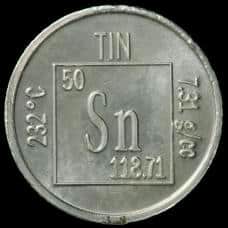Tin’s discoverer is unknown but one thing is known. Tin has been used and discovered by the ancients. Tin was an accidental discovery. Tin  has been around for many years. Proof is in the fact that tin is mentioned in the old testament of the bible. Tin had a great effect on the world because of its low price, high electric conductivity, and because tin protects against rust and weak acids in food if the can is made out of tin instead of aluminum. Some common compounds of tin are organtin a combination of carbon and tin. When tin is formed with carbon to make organtin it can make more than 500 organtin compounds. These compounds are used in everyday things. One is toothpaste containers and also are things such as wood, paper, textile, farm sprays, and Hospital disinfectants. To get pure tin you must first find ore cassiterite or tin stone, a dioxide of tin. The ore cassiterite before smelting and roasting must be crushed into a powder to remove the arsenic and sulfur from the ore cassiterite. When you smelter the tin you must heat it with carbon to remove the zinc, copper, bismuth, and iron from the tin. Tin had been used for many things but tins use is dropping rapidly although tin is still used a lot for plating. Plating such things as electrical contacts.
has been around for many years. Proof is in the fact that tin is mentioned in the old testament of the bible. Tin had a great effect on the world because of its low price, high electric conductivity, and because tin protects against rust and weak acids in food if the can is made out of tin instead of aluminum. Some common compounds of tin are organtin a combination of carbon and tin. When tin is formed with carbon to make organtin it can make more than 500 organtin compounds. These compounds are used in everyday things. One is toothpaste containers and also are things such as wood, paper, textile, farm sprays, and Hospital disinfectants. To get pure tin you must first find ore cassiterite or tin stone, a dioxide of tin. The ore cassiterite before smelting and roasting must be crushed into a powder to remove the arsenic and sulfur from the ore cassiterite. When you smelter the tin you must heat it with carbon to remove the zinc, copper, bismuth, and iron from the tin. Tin had been used for many things but tins use is dropping rapidly although tin is still used a lot for plating. Plating such things as electrical contacts.
Tin is also used as a protective coating. This protective coating can be as small as 15/1,000,000 of an inch. This protective coating protects against rust on steel and other metals. A coating of tin also gives a great look to plain old steel. Tin cans for food prevents weak acids from damaging the inside of the can. Not many cans are made of tin since aluminum started to be used for cans tins use dropped sharply. Tin is also used to coat staples, pins, bronze bell, pewter pitchers and many others things. Another popular tin mixture is tin and lead. Tin and lead make solder for electric work. Battery contacts in the Black and Decker snake lights are also tin plated. A compound tin salt is used to spray onto glass windows to produce electrically conductive coating for panel lighting and frost free windshields for cars. One last use for tin is in the making of glass windows that are made by floating molten glass on molten tin. This produces a flat piece of glass to be used as windows
Industries basically only use tin for plating for electricity or for protection on their metals such as tin.Tin is found in Molaya, Bolivia, Indonesia, Zaire, Thailand, Nigeria, but almost no tin is found in America, although some tin has been found in Alaska and California. Tin has an atomic number fifty on the periodical table of the elements. Tin’s atomic symbol is Sn. Tin’s atomic weight is 119 amu (118.69 amu). Tin’s electronic configuration is 2-8-18-18-4. Tin is in Group 14. Tin has a gray color unless heated then it turns white. Tin is also a malleable and ductile element. Tin is a very soft metal. Tin melts at 450 degrees F. Tins density is 7.2984 centimeters squared. Tin has 69 neutrons and 70 protons.
